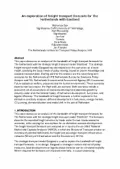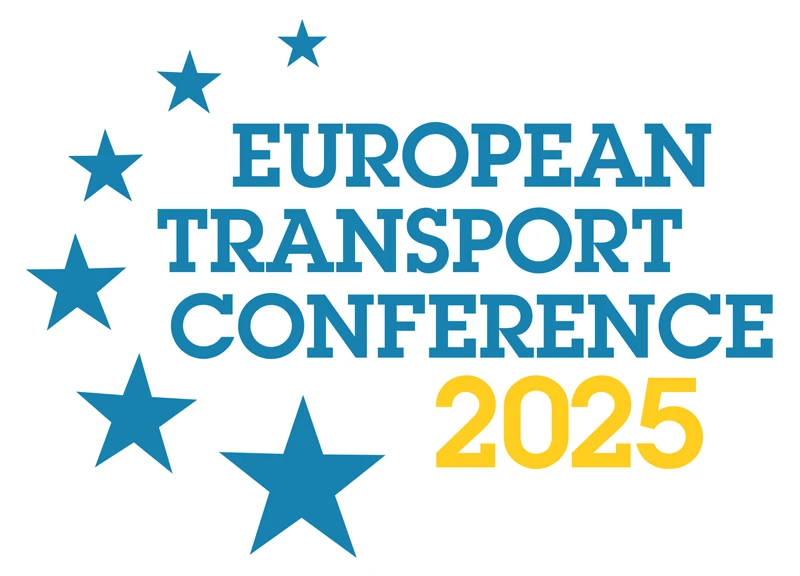-
Past ETC Papers

Browse, search and view papers from the past AET Conferences.
-
Members' Area

AET promotes networking and exchange of ideas, information and opportunities amongst members.
Conference Papers 2017
Barcelona, Spain
ETC Conference Papers 2017
An exploration of freight transport forecasts for The Netherlands with BasGoed
Seminar
Day 1 (4 Oct 2017), Session 1, Aggregate Freight Transport Modelling, 11:30 - 13:30
Status
Accepted, documents submitted
Submitted by / Abstract owner
Michiel de Bok
Authors
Michiel De Bok, Significance, Jan Kiel, Panteia, Jan Francke, The Netherlands Institute for Transport Policy Analysis
Short abstract
This paper discusses an analysis of the bandwidth of freight transport forecasts for The Netherlands with the strategic freight transport model ‘BasGoed’.
Abstract
An exploration of freight transport forecasts for The Netherlands with BasGoed
Michiel de Bok, Bart Wesseling (Significance), Jan Kiel (Panteia), Onno Miete (Rijkswaterstaat), Jan Francke (The Netherlands Institute for Transport Policy Analysis, KiM)
This paper discusses an analysis of the bandwidth of freight transport forecasts for The Netherlands with the strategic freight transport model ‘BasGoed’. The forecasts describe the expected freight volumes by mode under the two macro economic scenario’s, while varying the assumptions for four distinctive scenario developments.
Once every four years, the Dutch Ministry of Transport analyses its transport infrastructures to create an inventory of bottlenecks for freight and passenger transport and for each transport infrastructure network (road, rail or inland waterways). Where available, the modus operandi is to use transport models for a systematic, quantitative analysis. The strategic freight transport model Basgoed is one of the instruments used, and provides multimodal freight forecasts. These forecasts are used as quantitative inputs in sectoral studies that make a more in-depth (uni-modal) analysis of the rail-, inland waterways-, or the road networks. These sectoral analyses are much more detailed compared to a strategic study with a transport model and also include qualitative analyses and stakeholder involvement (rail network managers, port authorities, etc.). The forecasts from Basgoed are a vital input to the detailed sectoral analyses, and thus sensitivity analyses are a useful method to test the impacts of scenario assumptions or bandwidth of freight transport forecasts.
The strategic freight transport model Basgoed was developed over the past years as a basic model, satisfying the basic needs of policy making, based on proven knowledge and available transport data. Basgoed uses the economic module of the SMILE+ model (Bovenkerk, 2005) to calculate the production and attraction of regional freight volumes based on input/output tables, and generates freight flows by mode with two subsequent modules for distribution patterns and modal split (De Jong et al., 2011).
Starting point for the analysis are the recent long term scenarios for freight transport for the Netherlands. These scenarios describe two base cases: the High and Low scenario. Both scenarios include a consistent set of assumptions on economic development (domestic growth by industry sector and international trade), infrastructure development, fuel prices, and logistic efficiency. Furthermore, the BasGoed forecasts have been improved by adding developments at local and national level, which can not be predicted by BasGoed such as the closure of mines and power plants or the opening of planned large container terminals. The paper will compare the developments in the Dutch base scenarios to the previous freight scenarios for The Netherlands, and similar freight scenario’s for Germany, Belgium or the EU.
To explore the bandwidth of freight forecasts, the assumptions for four distinctive scenario developments or policy measures are varied. These include development in fuel price, logistic efficiency, energy markets, and a pro-active modal shift policy for the port of Rotterdam. The fuel price alternatives explore higher or lower fuel costs for road and inland waterways. The logistic efficiency alternatives explore the bandwidth when the basic parameters for load factors are varied between twice the assumed efficiency gains in the base scenarios and no efficiency development at all. The energy market alternatives explore a transition from fossil fuels to sustainable sources, and a transition from oil to more coal dependency. The base case scenarios assume a pro-active modal shift policy targeting at a maximum road modal share of 35% to and from the Maasvlakte port basins in Rotterdam.
The paper presents the policy context, the main assumptions behind the national freight scenarios, Basgoed’s model structure, and the assumptions and results of the sensitivity analyses.
Documents:

Association For
European Transport
Forester House
Doctors Lane
Henley-in-Arden
Warwickshire, UK
B95 5AW
+44 (0) 15 64 793552
VAT number: 710 1866 64
Conference Supporters & Endorsers




Legal Entity
The Association for European Transport is registered as an Association ('vereniging') with the Chamber of Commerce for Haaglanden in The Netherlands under company number 27170096.
Built on Zenario




